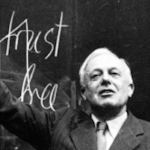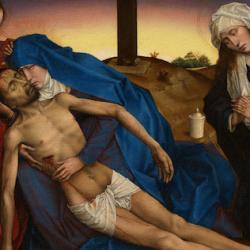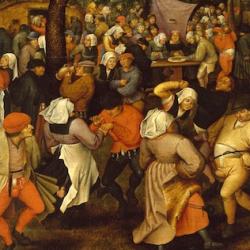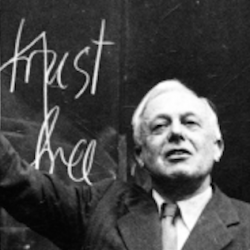II. The Cross in Christian Experience
How are the cross and resurrection reproduced in human life since Jesus’ cross and resurrection? Essentially, Jesus incorporated death into life. Christian faith means faith in a God who makes death into a positive feature in life.
Rosenstock-Huessy observes that life is suffering, battle, pain, shock, failure, elation. Human beings are always torn, always riven. Much of human life, individually and collectively, is an effort to deal with suffering and death. By being the first Man, Jesus establishes the possibility of a different stance toward suffering and death. Life after the cross, and life in the cross, is a life in which death never has the final word, but where death is a path toward new, more expansive life.
Writing in 1946, Rosenstock-Huessy says, “twenty years ago I felt that I was undergoing a real crucifixion. I was deprived of all my powers, virtually paralyzed, yet I came back to life again, a changed man. What saved me was that I could look back to the supreme event of Jesus’ life and recognize my small eclipse in his great suffering. That enabled me to wait in complete faith for resurrection to follow crucifixion in my own experience. Ever since then it has seemed foolish to doubt the historical reality of the original Crucifixion and Resurrection” (CF, p. 102).
This is not “survival.” It is renewal through death, death transformed into a “positive feature” of life, the key to abundant life.
Jesus, in short, reveals the “Living God.” Unlike the gods of the philosophers, the Living God is never an object. This Living God confronts us in the midst of life. He is never an axiom of reason: “The living God cannot be met on the level of natural reason because by definition he crosses our path in the midst of life, long after we have tried to think the world into a system” (CF, p. 96).
God is always revealed in the cross; God always comes first of all in the form of catastrophe, raising the possibility of death: “That power which compels us to answer a question of life and death—and ‘any part of the world, sun, earthquake, crisis, revolution, can become a god when we feel that it is a power urging this question upon us’—is always our God; ‘the power which makes the atheist fight for atheism is his God’” (CF, p. 96).
When they confront us, the gods “demand our devotion, not lip service.” A person can be wholly godless only if he acknowledges no power at all above him; a godless person would have to “be all of god himself.” Modern man is not godless but polytheistic, pursuing many gods or “values”—Rosenstock-Huessy enumerates “art, science, sex, greed, socialism, speed—these gods of our age devour the lives of their worshipers completely” (CF, p. 96).
Powerfully addictive though they are, none of these gods can finally satisfy, nor can they enslave forever. Promiscuity wears thin, “socialism annoys the man of sixty,” and “greed is hardly conceivable to a young person.” These gods fade, but the Living God is the God of the future and so always endures beyond death (CF, p. 97).
Faith in the God of the future, who is also the God revealed in the cross, enables us to die to the gods and move toward the future. Without the revelation of the cross, death to the gods would be impossible: The impotent man might as well commit suicide, since he has lost his reason for life. If you lose your fortune on the stock market, you look for the nearest window on the top floor of the nearest skyscraper.
Without the cross, death to the gods is simply death. But the revelation of the Living God enables us to slough off gods when they grow old.
Gods can not only be shed, but this shedding process is the means of transformation. Because of Jesus, “death has paradoxically become the key to everlasting life.” Christians can anticipate death in order to overcome it: “By learning to anticipate the inevitable end which the pagan fights off, man has robbed death of its paralyzing gloom. Anticipating the worst, he can bury his dead in time. A pagan was ready enough to die physically—for his family, temple, guild, nation, or race—but these he held to be immortal and therefore without flaw. He could not admit the necessity of letting them die when the time had come; hence all went down together.”
Through the cross, Christians recognize that life will necessarily involve regular deaths to their old ideas, ideals, allegiances. Anticipating and embracing these partial deaths as the beginning of new life and new future, Christians are not faced with the threat of a total death as the pagan was. We know that gods come and go, and we can let them go without anxiety, because we know that renewal is over the next ridge.
When death is incorporated into life, and anticipated in faith, life becomes abundant. This was Jesus’ purpose—not to negate life, but to give life, abundantly: “Christianity is not a decadent worship of death for its own sake, but the discovery that including death within life is the secret of the fullest life” (CF, p. 124).
Monks and hermits witness to this: By giving up the world before death, “they proved that death is an essential element of living, in fact its sharpest ingredient.” Even those who are not cloistered give up life in order to live: “Any father, manager, or teacher has to practice resignation and let the young learn by doing things he could do better himself; for he knows that one day he must die and they must take his place.”
This does not come from “our instinct of life” but “from our wisdom of death.” For Rosenstock-Huessy this is what it means to have a soul: “Man as an animal organism lives forward from birth toward death, but, as a soul who knows beforehand that he will die, he molds his life looking backward from the end” (CF, p. 124). To have a soul is to live through and beyond death.
What happens when we are torn, divided, riven without recognizing that it is a “human privilege,” without faith in resurrection? We lack soul, and we cannot live abundantly. There are also political consequences. “If a man does not know that it is perfectly normal to be thus torn, and that a divine power exists which integrates persons by uniting them in communion, he will surrender to any man-made power that seems to promise unity, fixity, and security.”
This is was one of the sources of the attraction to Nazism: “Torn men are dangerous men. They will go to hell and worship the devil of power for power’s sake, in the form of any wild desire, unless we reestablish the power of the Spirit in its original white heat.” Our efforts to avoid the cross, and the suffering that comes with it, condemn us to insignificance. “The basic law of all history: only where extreme resistance is overcome does a new origination become possible. Usually we live according to the law of least resistance.”












